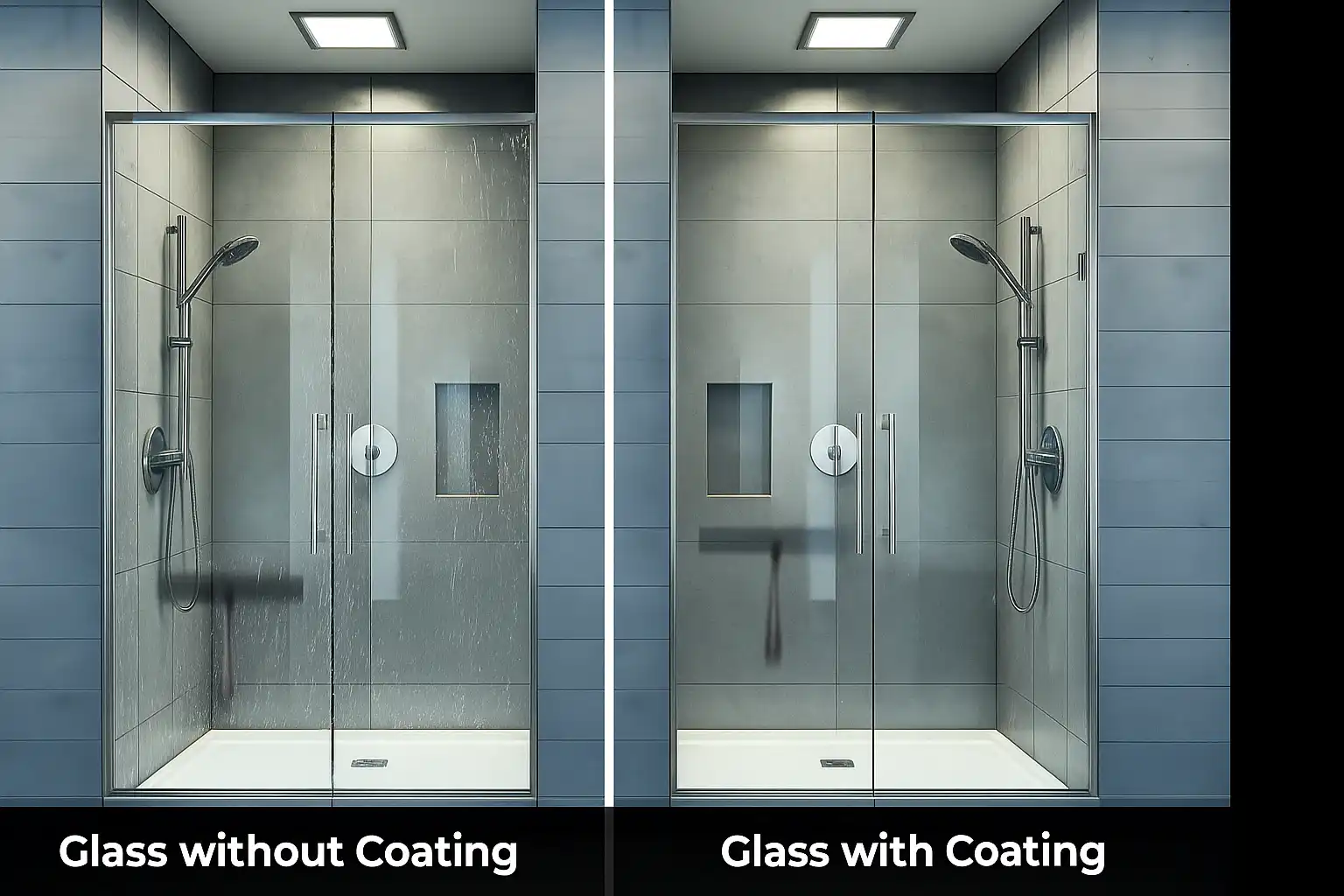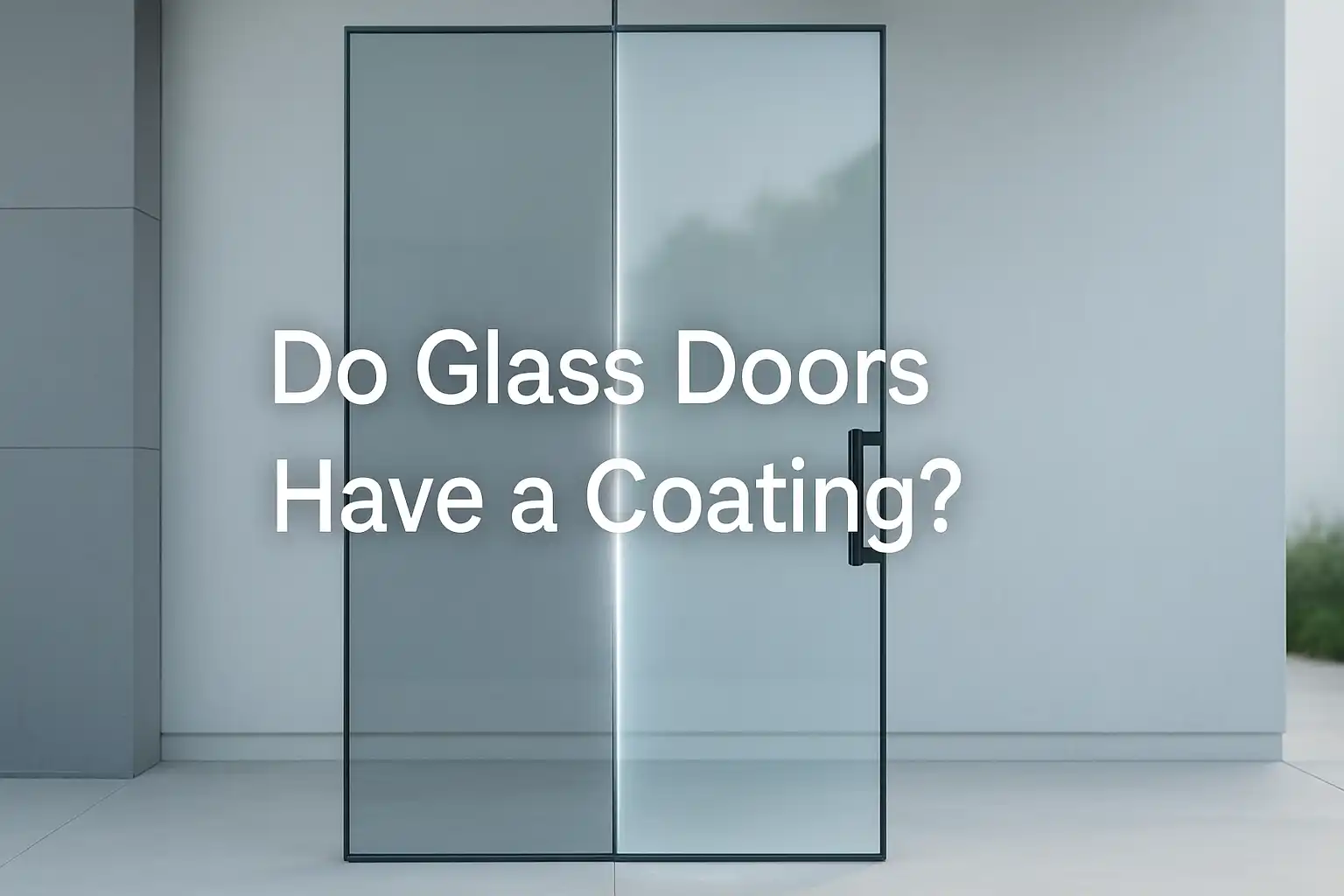Ever noticed how some glass doors stay spotless for weeks while others get foggy and streaked in days? The secret might just be in the coating whether you’re renovating a bathroom or choosing a patio door, understanding how glass coatings work could save you hours of cleaning and extend the life of your doors.
Do Glass Doors Have a Coating on Them?
In most cases, glass doors do not come with a coating by default. Coatings are usually added by the manufacturer or installer to protect against water stains, soap scum, and mineral deposits. These coatings create a hydrophobic layer that helps repel dirt and reduces cleaning time.
Understanding Shower Glass Coatings
Not all glass is created equal, especially in wet environments. Shower glass coatings are designed to protect the surface from becoming a magnet for hard water stains, soap scum, and mineral deposits. These coatings form a microscopic, invisible barrier that prevents buildup and reduces the frequency of deep cleaning.
Most coatings are hydrophobic, meaning they repel water rather than absorb it. Since glass is naturally porous, these coatings work by sealing the tiny pores on the surface, making it much harder for grime to take hold. Think of it like a non-stick pan, but for your shower door.
How Does a Shower Coating Work?
A shower glass coating acts like a shield, bonding at a molecular level to create a non-stick surface. This invisible layer blocks water, oil, and soap residue from clinging to the glass. The result? Fewer streaks and almost no buildup over time.
There are two main types: factory-applied coatings, which are baked onto the glass and can last up to 15 years, and spray-on DIY versions, which are easier to apply but need frequent reapplication, sometimes as often as once a month.
Do All Glass Doors Come with a Coating?
Surprisingly, most glass doors do not come pre-coated. Unless specified, manufacturers typically ship them untreated. Homeowners or installers often choose to add a protective coating later, especially for doors exposed to moisture, like in bathrooms or near pools.
I remember helping a friend install a glass patio door in his Colorado home. A week later, he was baffled by the streaks and water spots after one rainstorm. Turns out, it didn’t have a coating. A quick trip to the hardware store for a spray-on sealant saved him hours of weekly scrubbing—and a lot of frustration.
Whether you’re buying new or upgrading old doors, always ask if a hydrophobic coating is included. It’s a small detail that makes a big difference.
Do All Glass Doors Come with a Coating?
Surprisingly, most glass doors do not come pre-coated. Unless requested, manufacturers often ship them untreated. That’s why many homeowners choose to add a protective coating during installation, especially in moisture-prone areas like bathrooms or poolside enclosures.
I remember helping a friend install a glass patio door in his Colorado home. A week later, he was baffled by the streaks and water spots after just one rainstorm. Turns out, it didn’t have a coating. A quick call to a local pro saved him hours of scrubbing. He ended up hiring Hansen Glass Inc. to apply a professional-grade sealant that’s still holding up beautifully months later.

If you’re investing in new glass doors or want to extend the life of existing ones, a trusted specialist like Hansen Glass Inc. can apply the right coating and ensure a flawless finish.
Factory‑Applied vs. DIY Spray Coatings
When it comes to glass door protection, you have two main options: factory-applied coatings or DIY spray-on sealants. Both serve the same purpose, shielding the glass from hard water, soap scum, and mineral deposits, but differ in durability and convenience.
Factory-applied coatings are professionally bonded during manufacturing, offering up to 15 years of protection. They’re more expensive, adding roughly $500 to the cost of installation—but require little to no maintenance. Some even come with lifetime warranties.
DIY spray coatings, on the other hand, are more affordable and accessible. However, they need to be reapplied every few weeks or months, and the level of protection is often less consistent.
If you want long-lasting results without the hassle, consider working with local experts like Hansen Glass Inc., who can help you choose and apply the best coating for your needs.
Pros and Cons of a Shower Glass Coating
Glass coatings can make life a lot easier, but they’re not without trade-offs. On the plus side, they drastically reduce cleaning time, help prevent water stains, and keep your glass looking newer for longer. In fact, some coatings can cut cleaning by up to 90%.
However, the downsides are worth noting. Factory coatings come at a higher upfront cost, and DIY sprays often require frequent upkeep. Some users also report that cheaper coatings can wear unevenly, leaving patches over time.
If you value low-maintenance living and a streak-free look, the benefits usually outweigh the drawbacks, especially in high-use spaces like showers.
Benefits of Diamon‑Fusion® Glass Coating
Diamon‑Fusion® is one of the leading names in glass protection technology, known for its long-lasting performance and eco-friendly properties. It creates an ultra-thin, invisible barrier that transforms ordinary glass into a water-repellent, scratch-resistant surface.
This coating is popular in residential and commercial settings, including luxury hotels, because it can reduce cleaning time by up to 90% and often comes with a lifetime warranty. Unlike temporary DIY options, Diamon‑Fusion® chemically bonds with the glass for lasting durability.
It’s not just about convenience, it’s about protecting your investment and keeping your glass crystal-clear for years.
Hidden Benefits: Safety & Sustainability
Beyond clean glass and convenience, coatings offer some often-overlooked perks. A quality glass coating can improve scratch resistance, UV protection, and overall durability, making your doors safer and more resilient over time.
On the sustainability front, coatings help reduce the use of harsh cleaning chemicals and minimize water consumption during maintenance. In fact, treated glass surfaces can lower cleaning-related water usage by 30–67%, making them an eco-smart choice for environmentally conscious homeowners.
When you think of glass coatings, think beyond the surface, they’re a quiet upgrade that pays off in safety and sustainability.
Calculating Cost vs. Lifespan
When deciding between coating options, it helps to think long-term. A factory-applied glass coating may add around $500 upfront, but it often lasts 10 to 15 years with minimal maintenance. Over time, that breaks down to just a few dollars a month for crystal-clear glass and almost no scrubbing.
In contrast, DIY spray-on coatings might cost under $50, but depending on usage, they need to be reapplied every few weeks or months. The cost and effort can add up quickly, especially in high-traffic bathrooms.
If you’re after convenience and durability, the higher initial cost of a professional-grade coating often brings better value in the long run.
Environmental Impact & Water Savings
Glass coatings aren’t just about cleaner doors; they also make your home greener. By repelling water and grime, they cut down on how often and how intensely you need to clean. That means less water usage, fewer harsh chemicals, and a reduced environmental footprint.
According to a research study, glass surfaces treated with hydrophobic coatings reduced water use for cleaning by 30–67% due to self-cleaning effects
In fact, more studies show that treated glass can reduce maintenance-related water use by 30–67%, which adds up significantly over the years. For eco-conscious homeowners, that’s a win-win: easier upkeep and a positive environmental impact.
Choosing a coating is more than a cosmetic upgrade; it’s a step toward a more sustainable, low-maintenance lifestyle.
Ready to Protect Your Glass the Smart Way?
If you’re in Parker, CO, or nearby and want expert advice or professional glass coating services, Hansen Glass Inc. is just a call away. Our team can help you choose the right solution, whether you’re upgrading your shower, patio doors, or anything in between.
Get crystal-clear results with less hassle. Contact Hansen Glass today to schedule a consultation or request a quote.
Final Thoughts
Glass door coatings may be invisible, but their impact is anything but. From easier cleaning and longer-lasting clarity to real savings in time, water, and effort, they offer a smart upgrade for any home. Whether you’re installing new glass or refreshing what you have, choosing the right coating can protect your investment and simplify your routine.
Take a closer look—what seems like a small detail might just be the clearest improvement you can make.
Frequently Asked Questions
Q: Can you see the coating on a glass door?
No, most glass coatings are completely invisible. They work on a microscopic level to repel water and grime without altering the appearance of the glass.
Q: How long do glass door coatings last?
Factory-applied coatings can last 10 to 15 years, sometimes even longer with proper care. DIY spray-on coatings typically last a few weeks to a few months and require regular reapplication.
Q: Do I need a coating if I clean my glass regularly?
While regular cleaning helps, a coating reduces buildup and makes cleaning much easier. It also protects the glass from long-term damage like etching from hard water.
Q: Can I apply a glass coating myself?
Yes, there are many spray-on options available for DIY use. However, they’re less durable than factory-applied coatings and need more frequent upkeep.
Q: Is a glass coating worth the cost?
If you want to save time on maintenance, prevent staining, and prolong the life of your glass, the cost is often well worth it, especially in moisture-heavy areas like showers.


